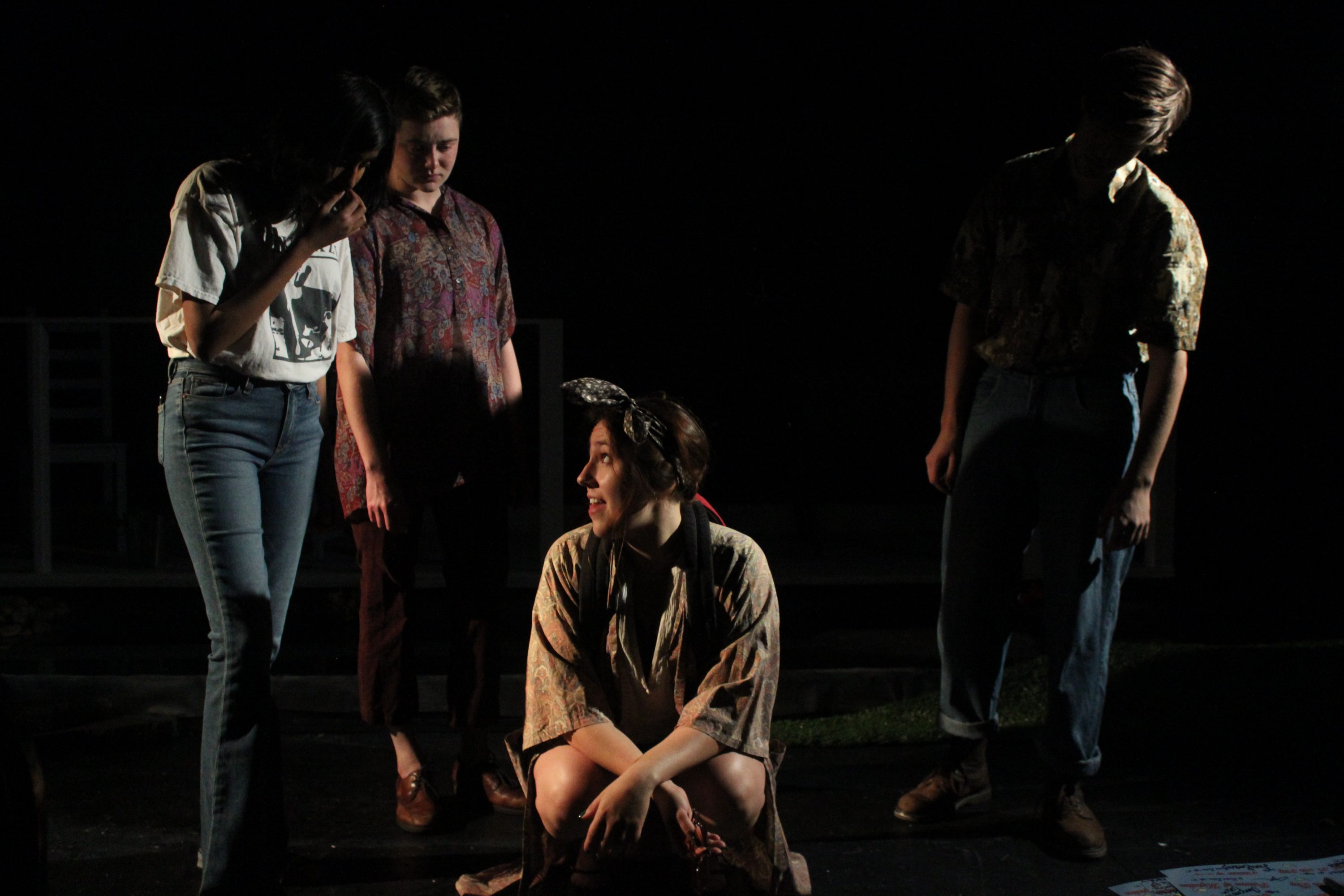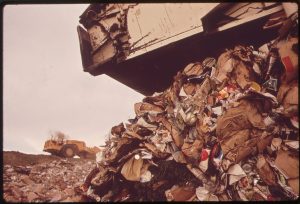One week before opening night on Nov. 13, the storm was raging at full speed. Mask and Bauble staff members yelled to each other over a thunderous cacophony of crows, a myriad of colorful lights flashed from every angle, and a pool of water slowly collected at the foot of the stage.
For months they have been designing and building, rewriting and discarding, and practicing around the clock to bring the 34th annual Donn B. Murphy One Acts Festival (DBMOAF) to life. But the excited chaos of this rehearsal was no abrupt weather change. It has been building since last spring, since before the scripts were chosen—when the first raindrops began to fall.
Each spring, the DBMOAF staff receives anonymous script submissions from Georgetown playwrights, and they are tasked not only with choosing their favorite shows but also with weaving them together into one connected production. While in the past two years they have chosen two or three shows to focus on, one year performing them in full, this year’s staff decided to get creative and string together scenes from four different plays into a linear storyline about friendships, location, and climate change.
“This year, we are trying to celebrate more student work and be able to look at multiple different shows in a cohesive, larger performance, but also individually be able to recognize and acknowledge each student’s contributions,” producer Cory Kleinman (COL ’21) said in an interview with the Voice.
The show first features excerpts from Patterns of Migration by Rachel Linton (SFS ’19) and Froglets by Zackary Rettig (SFS ’19) followed by the main act, Marblehead, MA by director Amelia Walsh (SFS ’20), and ending with a scene from I Will Come forth as Gold, a Job Play by Timmy Sutton (COL ’20). While each show is incredibly different, the DBMOAF staff has chosen parts of each script that focus on the people and places we call home.
Kleinman and the rest of the DBMOAF staff were intrigued by the environmental aspect of Marblehead and used that to anchor the other scenes. “We really liked the fact that there were families and friendships that were being explored in very specific locations,” Kleinman said. She also emphasized Job role as a provocative examination of the rest of the production. “Whether it is the destruction or the rebuilding or just sort of that moment in between was a really interesting thought that we played with.”
The main act, Marblehead, follows a family of four as they navigate the deterioration of society in the face of extreme weather patterns induced by climate change. Walsh started the script when she was studying abroad in Senegal and feeling homesick. She was looking for something to ground her, and, naturally, she found that in writing about Massachusetts, the place she calls home.
As a Science, Technology, and International Affairs major with a concentration in Environment and Energy and the President of Georgetown Renewable Energy and Environmental Network (GREEN), environmental issues consume a large portion of Walsh’s academic and personal life.
“Originally I was thinking about what to write about, and I was like ‘Well…what motivates me?’ And a lot of it is my fear of the future because of climate change,” Walsh said. “Like a year or two ago, it kind of dawned on me. I’ve always heard about sea level rising. And then I saw a map of like how the east coast will look in like 30 to 40 years, and like everything I knew and grew up in is underwater,” she said.
With that ominous backdrop, Walsh sought to write about what it might look like if that scenario came to fruition and people were faced with the decision to leave their homes. Even in the midst of complete disaster, some characters hold on tightly to everything they know, while others can’t fathom staying in such a dangerous situation.
“This isn’t a home that is a really happy home. This is a home that’s really stressed and kind of reaching their end as a house, as like a home, as a family in this specific location,” Walsh said.
But like sunshine before the storm, Rachel Linton’s Patterns of Migration and Zackary Rettig’s Froglets usher in a lighthearted air before the darkness of Marblehead can unravel. Both excerpts are energetic and fun with a nostalgic undercurrent that will make the audience long for the characters to remain carefree children. The opening scene from Patterns features four friends on their last day at home together before three of them leave for jobs and school, and, much like in Marblehead, some of them are more comfortable with change than others.
Both hope and doubt fizz to the surface in Patterns, and these emotions flood effortlessly into the next scene, pulled from Froglets. Three childhood friends take the stage, goofing around as if they are spies in an alternate reality. Similar to Patterns’ recurring themes, Rettig intended for Froglets to explore childhood friendships and what it means when they change.
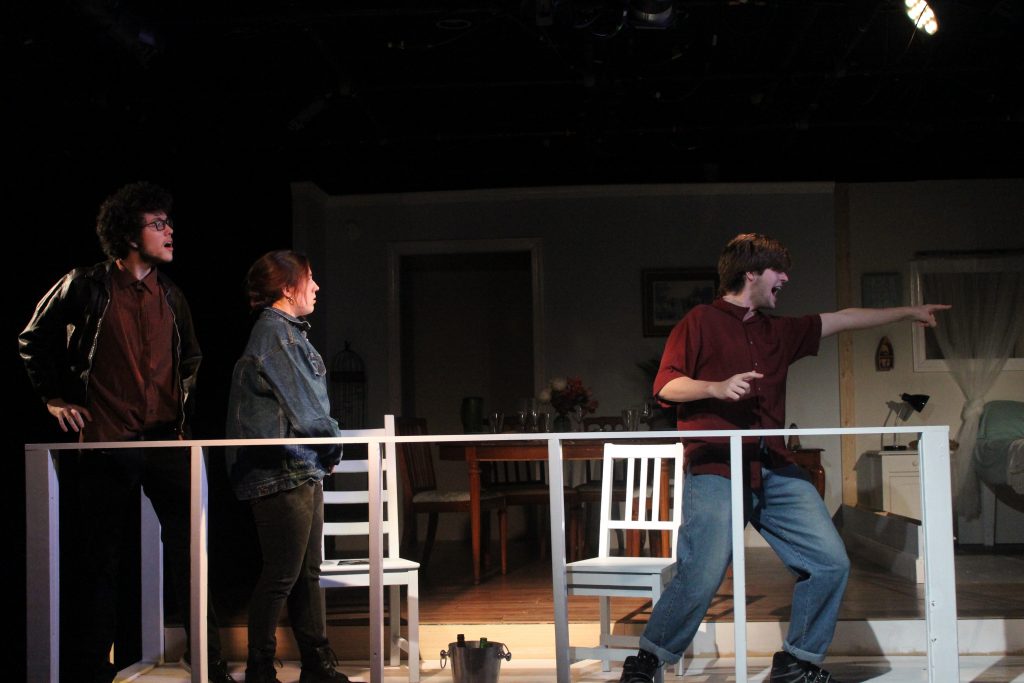
Photo by Kate Clark Photo credits: Kate Clark. Pictured left to right: Gabriel Berger, Kylie Navarro, Nick Giotis.Photo by Kate Clark
“The most prominent theme I would say is a fear and frustration with growing up and the passage of time. A difficulty with letting go of youth. Cramming in as much quality time with your childhood as you can while it’s in hospice care,” Rettig said in an email to the Voice.
It is fitting that Froglets gives way to Marblehead, in which the characters are finally confronted with the absoluteness of letting go. And yet, the final scene from Timmy Sutton’s I Will Come forth as Gold, a Job Play scratches all of that. In a retelling of the classic Bible story of Job, this excerpt from Sutton’s play is the perfect ending to the festival as it questions the finality of decisions made in earlier scenes and grapples with the circular nature of life. Job is the rainbow when the storm lifts, but in the sense that the ending is not concrete—it’s an optical illusion and each audience member will interpret it differently.
While these stories present complex thematic elements, the dramatic process of telling them is an entirely different feat. While the actors with depicting the content of the plays, the technical team was equally tested by the show’s logistical demands.
This year’s festival is incorporating something that has not been used in Georgetown’s recent theater history: water.
The nearly finished set in Poulton Hall features a family dining room decorated with antiques, a picture-perfect teenage bedroom, and a front porch completed with resting chairs and a golden telescope. At the foot of the set is an empty vat covered over in black lining that will be filled with water for the performance.
“Water hasn’t been done in this space in a while or ever—not that I’ve heard of. And no current students have done a show that has water in it, so it’s been an adventure of learning how to waterproof things,” technical director Phoebe Shiffman (COL ’22) told the Voice, minutes before filling the pool for the first time.
Shiffman uncoiled the hose and positioned in the pool. The actors on stage stopped, mesmerized. The element of water had been discussed for months, and it was finally being added to the show.
“If it starts spitting out water, I’m going to freak out,” actor Nick Giotis (COL ’23) said.
“Get ready to freak out,” Walsh replied.
With the pool successfully filled, the actors took full advantage of its presence. Kate Oelkers (COL ’21), who finishes the show submersed water, excitedly walked straight in without a second thought, even though her shoes got soaked. And her character won’t be the only one drenched during the performance. Kylie Navarro (COL ’20) is enthusiastic about the fact that her character Clara is going to be hosed down before entering the stage since she is always entering from the rainstorm.
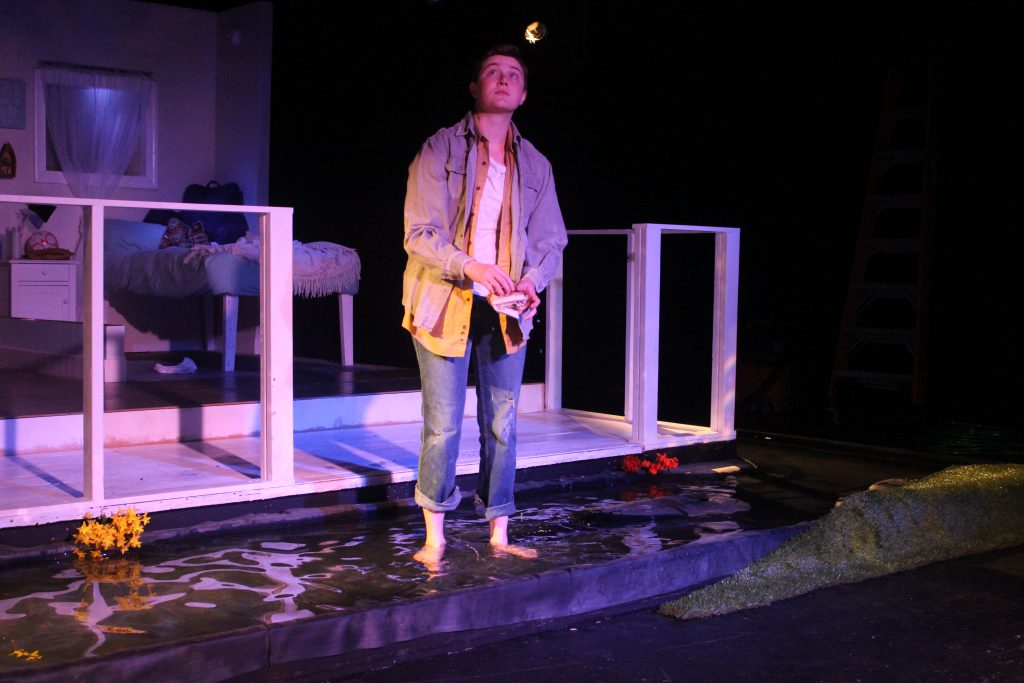
Photo by Kate Clark Photo credits: Kate Clark. Pictured: Kate Oelkers.Photo by Kate Clark
But the water is only one element of many. According to Shiffman, it took between four and five weeks to build the set. With one week to go, they were still adding things like a box that hangs from the ceiling and can be opened to allow things to fall from the sky, which will happen three times during the show. The soundscape created a new layer to the performance, filling in the silences with bird calls, crackles of thunder, and acoustic melodies.
With an innovative technical team taking charge of water and flying objects on top of the basic design and set elements, the festival ultimately falls on five incredibly talented actors who have been tasked with playing almost three times as many characters. While they are cast in roles with qualities that tend to transcend scenes, they exhibit unbelievable talent in creating a different persona for each of their characters, a feat that took months of hard work.
Walsh emphasized the importance of character work in the initial rehearsals. The first week, the cast sat down, read through the script, and had the opportunity to discuss how the topics related to their lives and ask questions about their parts.
“Now that I’ve given them a chance to understand these characters that I’m thinking about, they can take it to places that even I could not think of myself,” Walsh said. “They are just thinking about individual characters and have such nuanced and interesting takes.”
In the following rehearsals, Walsh would have the actors read through one section and then do a completely improvised scene to fully embody their characters and what they might do in different situations. Afterwards, Walsh would share her notes and the actors would discuss the choices they made with the group.
On one September night, they sat around the cool blue Santos room in Poulton Hall debriefing an improv session as their Marblehead characters. The actors seemed both surprised and proud of themselves, having found it a useful but challenging exercise to completely stay in character during such an intense scene. Oelkers, who plays the daughter, Frances, talked to the group about the experience of fully adopting her character’s mindset when faced with her parents asking one thing of her and the girl she has feelings for asking another.
“I feel so vicariously stressed after doing these things. Like, they have to choose,” she said.
Walsh encouraged the actors to push themselves and test their limits in this space to see just how far they can go. She asked them to over-exaggerate their actions so they know what reserves they have to draw on when it comes down to show.
“If you hear someone yell, yell louder,” Walsh told them.
Today, it’s hard to fathom the actors at such an early stage. With a week left before the show, the actors can become any one of their two or three characters in mere seconds. During breaks to adjust the lights and sound, Giotis jokingly drops a beat and entertains the staff with sarcastic spoken word verses about a walk-in-the-park kind of love. Anika Venkatesh (SFS ’22), Gabriel Berger (COL ‘21), and Oelkers huddle around the set’s kitchen table cracking jokes and laughing.
But the moment stage manager Annemarie Cuccia (SFS ’22) calls for them to restart, they snap back into character. Giotis’ smile falls, and he seamlessly resumes his surly attitude as Marblehead’s Thomas. Venkatesh, Berger, and Oelkers look as though they were never friends but always a family, stuck experiencing the most awkward dinner imaginable.
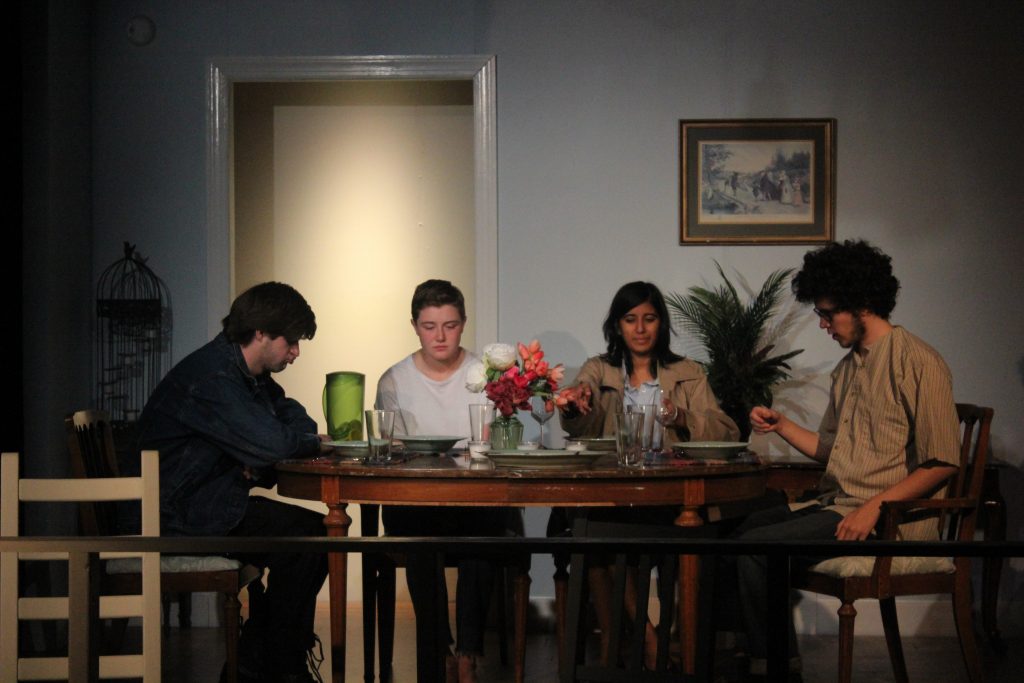
Photo by Kate Clark Photo credits: Kate Clark. Pictured left to right: Nick Giotis, Kate Oelkers, Anika Venkatesh, Gabriel Berger.Photo by Kate Clark
“Basically the idea is that you do a lot of work during the rehearsal process in thinking about the way your character thinks. And then by the time that you’re performing it, you don’t even have to really think that much about what you’re doing. It just becomes instinctual,” Kylie Navarro (COL ’20) told the Voice.
Navarro, who plays Daria in Patterns, Lomar in Froglets, and Clara in Marblehead, is the oldest and most seasoned cast member, and she undoubtedly has the most nuanced characters to portray as they tend to express the widest array of emotions. Her character is always the most rooted to their physical location, but each demonstrates it differently. Narravo uses a masterful toolbox of sighs, nervous laughter, sarcastic remarks, and yells to exhibit everything from slight doubt to utter heartbreak over breaking ties.
Where Navarro’s characters tend to be overly sentimental, Oelkers’ characters retreat from emotional honesty and hide behind sarcasm. As Kestrel in Patterns, Oelkers opens the show with a naively comical excitement about feeding birds. Linton’s humor is written into every line, but Oelkers channels her own uniquely hilarious personality into Kestrel. And it bubbles throughout the show.
“For me, in my own personal life as Kate, theater and comedy have been such great escapes. And I think the characters I play can relate to that, whether it’s Kestrel being their quirky self in order to create an alternate reality from a more unfortunate home situation backstory and the impending terrors of war, or if it’s Frances with her sarcastic, dry sense of humor,” she said. “I feel like they really speak to the way that I myself cope with things.”
Yet Oelker’s vibrant personality doesn’t hinder her from portraying complete hopelessness when real disaster strikes. In Marblehead, Frances is a young girl trying to ignore the gravity of the severe storms in her town while she navigates feelings that she has for Navarro’s character, Clara. Because Oelkers is always the most positive character, the weight of the situation becomes painfully heavy when she, too, becomes dejected and gives up.
Frances, soaking wet, stares into the pool that engulfs her and Clara’s feet. “We fucked up the earth, and now it’s fucking us up right back,” she laments.
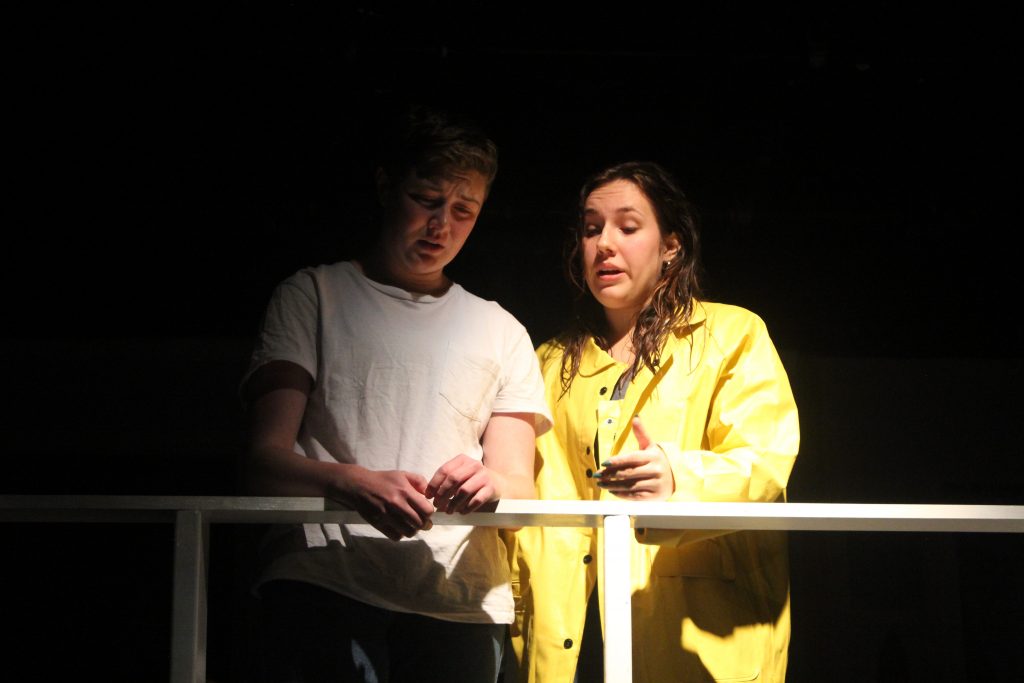
Photo by Kate Clark Photo credits: Kate Clark. Pictured left to right: Kate Oelkers and Kylie Navarro.Photo by Kate Clark
Aside from Frances in this small moment, Venkatesh’s character, Mom, seems to be the only one who truly understands the horrible damage that humans have caused on earth, and the monumental challenge of attempting to undo years of climate change.
“There’s a fight scene between me and my husband in the show, and a lot of it is about like, what am I supposed to do? ‘Do I refreeze the ice caps?’ is one of the lines. And I think that’s a pretty pertinent question, one that I’m still grappling with here at Georgetown,” Venkatesh said.
Venkatesh, who also plays Mari in Patterns, sees Mom as someone who wants to nurture and care for other people. Even when she wishes somebody would ask her how she is doing, she tries to put everyone else first. For the most part, this means silently helping others, but eventually, silence can no longer suffice as a means of protection. Her moment of release produces one of the most provocative conversations in the show.
In her fight scene with Dad, played by Berger, Mom is fully alive. Her performance calls upon the audience to consider their individual impact on the earth.
“Climate change is not my fault,” Dad yells.
“Then whose fault is it?” Mom icily responds.
And while that question is essential for the audience to answer, it no longer matters for the characters of Marblehead. What matters is surviving in the current conditions regardless of how they came to be. Driving that action falls upon the cast’s only freshman, Nick Giotis. Giotis, who performs as John in Patterns, Garrett in Froglets, and Thomas in Marblehead, plays the part of the idealist who believes in something better than his current situation.
“What I’m taking from the show is like not feeling one hundred percent confident in your circumstances, and yet having to live every day knowing that you’re just doing the best you can regardless of a little bit of insecurity,” Giotis said. “And some of that is like ‘Hey my friend group is kind of weird because I went to college and my two friends didn’t’ and some of that is ‘Hey the world is ending.’”
Giotis’ characters slowly dissolve from completely careless to faintly self-conscious and, finally, outright enraged. While he appears goofy and easygoing offstage, he easily transitions into Thomas, the irritable brother who is constantly angry as he itches to create a better situation. Giotis, who comes from a background of swimming, draws on his pre-race pat-down routine to undergo a physical character transition.
“I do a shake down before I go on, and, from that moment, I am just tense. And I just try to be tense the entire scene.”Giotis said. “I tap my foot and move my hands and try to like ball them up into knuckles and stuff and just be doing something because then because I’m physically tense. I start talking quickly, and I start thinking like what is happening.”
Gabriel Berger, who is also making his Georgetown theater debut in this year’s festival, has the opposite aim. Berger thrives as Froglets’ rambunctious Buster and Marblehead’s temperate Dad, but his most riveting performance is not until the end of the show, when he performs as The Helper, who represents God, in Job. While Giotis becomes gradually tenser, and ultimately releases that in the explosive and deeply moving climax scene in Marblehead, Berger’s final act calls for complete tranquility.
“I imagine God as something who is so enormously bigger and better than us that it should make us feel very small,” he said. “But I don’t see it as like the angry wrathful lightning storm in the sky…I just think God is a very gentle presence. The idea of a being that understands everything and comes from that enormous place to help and love us.”
Although he is quite literally playing God, Berger finds the experience humbling, as characterizing the divine is anything but simple.
“I think it’s challenging because the nature of the rehearsal process is you’re trying out a lot of different stuff. Like maybe God is going to be angry, maybe God is going to be awkward,” he said. “And that’s really intellectually difficult, especially as a person of faith. Like it’s hard to imagine God in a way that I don’t imagine Him.”
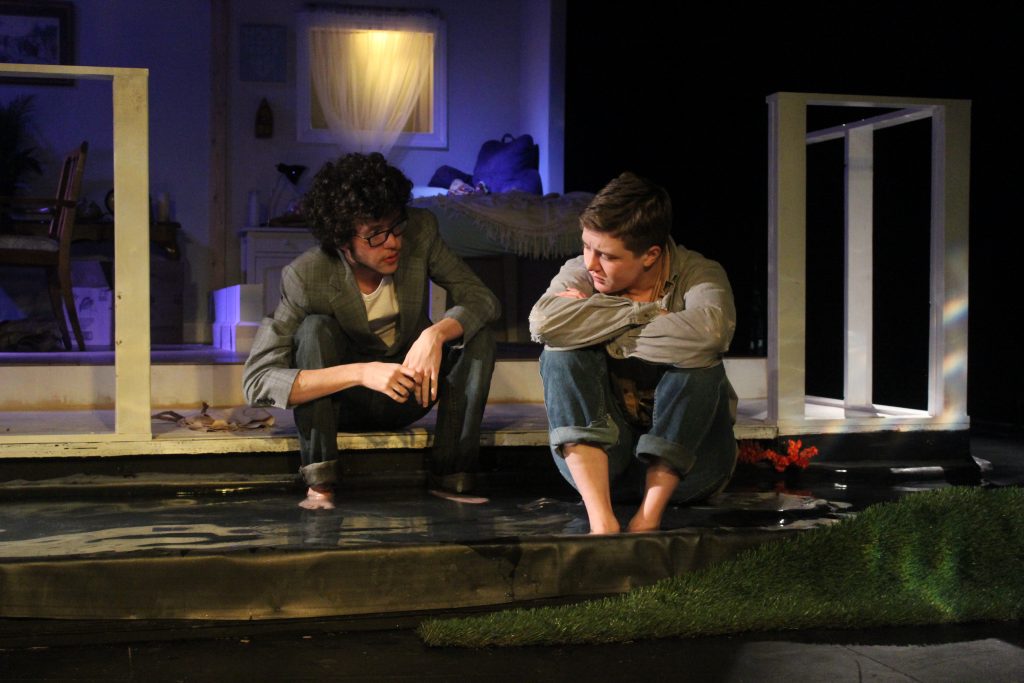
Photo by Kate Clark Photo credits: Kate Clark. Pictured left to right: Gabriel Berger and Kate Oelkers.Photo by Kate Clark
This year’s DBMOAF is a complex and unique collection of student contributions in every area from writing and tech to managing and acting. Months of progress have culminated into a poignant portrayal of difficult topics that will leave the audience with more questions than when they arrived. But it didn’t happen overnight. It started off as a slow and steady drizzle, harvesting energy until it turned into a full blown hurricane ready to hit the stage.
The DBMOAF staff has worked tirelessly to make it all happen, and they’ve gained more than just artistic experience from the process. When asked about their favorite part of the show, almost everyone said the people.
“I mean it’s a story about friendships and…connection between people. And I think that the five of us didn’t really know each other at all before we started doing this, and we’ve just gotten really close as a cast,” Navarro said.
The festival takes on worthwhile issues of relationships, climate change, and religion that are especially relevant for Georgetown students. In this show, the audience gets a preview of what it will look like when the flood comes and drowns out everything we’ve ever known.
“I live by the motto ‘Everything works itself out’ and I think that this is like a really cool set of shows where the question is ‘does everything work itself out?’” Giotis said. “For some of the characters it does, for some it doesn’t, but life goes on.”The festival will be running from Nov. 13-16 in Poulton Hall. Tickets can be found on Mask & Bauble’s website.


